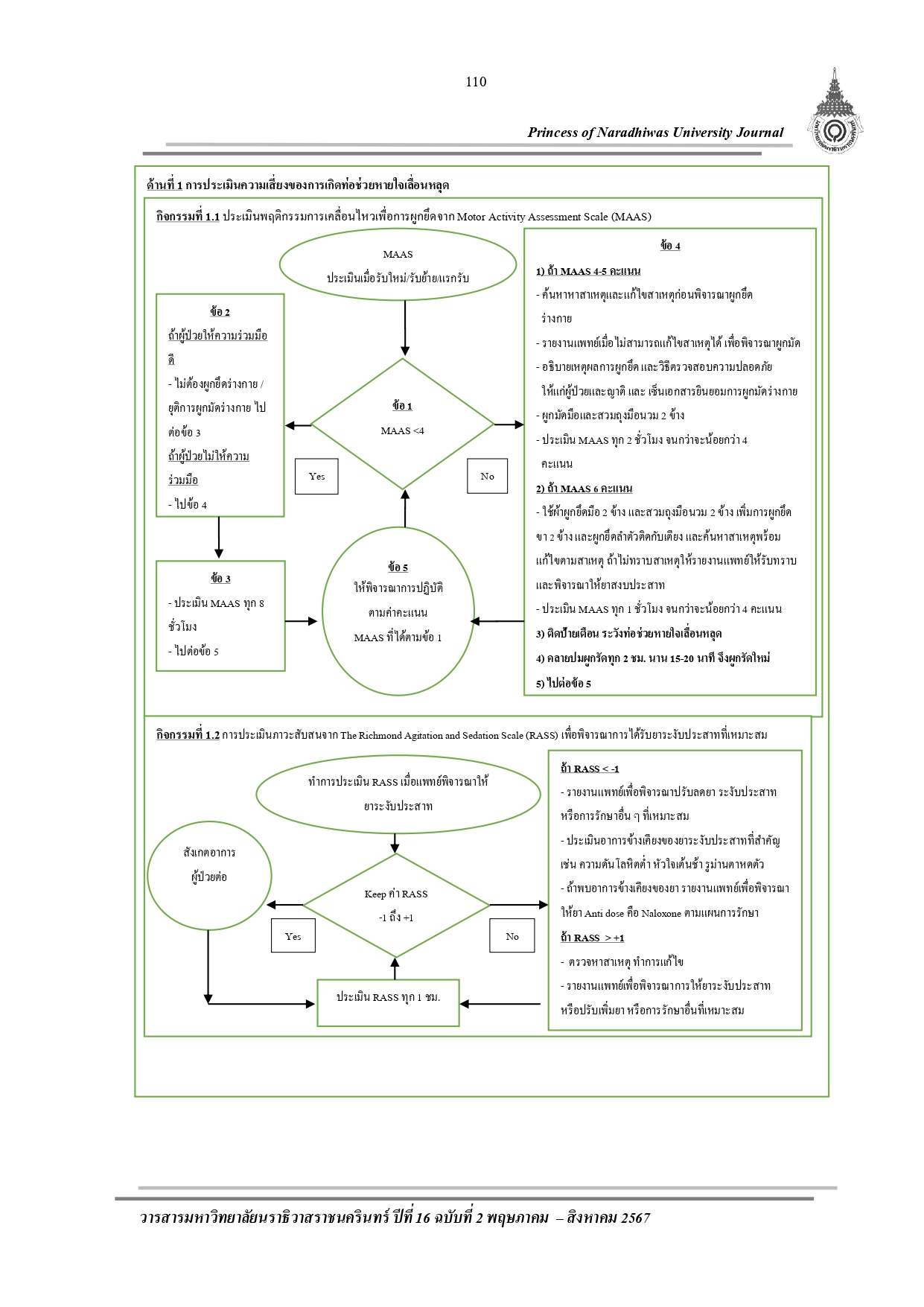Development of a Clinical Nursing Practice Guideline for Prevention of Unplanned Extubation in Medical Intensive Care Unit, Mahasarakham Hospital
Nalinrat Promso
Keywords:
Nursing practice guideline, Prevention of unplanned extubation, Medical intensive care unit, IncidenceAbstract
The purpose of this study was to develop a clinical nursing practice guideline based on advanced nurse practitioners' evidence-based practice to minimize unplanned extubation. There were three phases involved: phase one involved investigating clinical problems, phase two involved finding practice-relevant information, and phase three involved testing a clinical nursing practice guideline. A quasi-experimental study was conducted. Samples of this study were twelve nurses and sixty-two patients, split into control and experiment groups. In each group, there were thirty-one patients. The instruments utilized in the data collection process were the unplanned extubation incidence record form and the feasibility of a clinical nursing practice guideline form. The statistics used in this study were descriptive statistics and Chi-square test.
The results found that there were four components of a clinical nurse practice guideline for prevention of unplanned extubation: risk assessment for unplanned extubation; 2) nursing care during intubation; 3) information regarding intubation and communication; and 4) management administration. The results found that there were 8.47 and 4.44 unplanned extubation incidents in the control group and experimental group, respectively, throughout 1000 days of intubation. The proportion of unplanned extubations did not statistically substantially different between the two groups (χ 2 = .350, p > .05). Nurses exhibited a 100% of a high level in feasibility rate for applying the practice guideline.
The usage of this nursing practice guideline was deemed feasible. There was no discernible difference between unplanned extubation and short term usage. As a result, nurses ought to follow nursing practice guidelines for a longer period of time.
References
Abbas, A., & Lutfy, S. M. (2019). Incidence, risk factors, and consequences of unplanned extubation. The Egyptian Journal of Chest Diseases and Tuberculosis, 68(3), 346 - 350. http://doi.org/10.4103/ejcdt.ejcdt_165_18
Akkharawanasakun, B., Wangwan, K., & Mongkhonittivech, N. (2020). Effect of implementing clinical practice guidelines for unplanned endotracheal extubation prevention in medical intensive care unit 2, Chiangrai Prachanukroh Hospital. Changrai Medical Journal, 12(1), 73 - 81. https://he01.tci-thaijo.org/index.php/crmjournal/article/view/217537
Berkow, L., & Kanowitz, A. (2020). COVID-19 Putting patients at risk of unplanned extubation and
airway providers at increased risk of contamination. Anesthesia and Analgesia, 131(1), e41 – e43. http://doi.org/10.1213/ANE.0000000000004890
Fujishima, S. (2023). Guideline-based management of acute respiratory failure and acute respiratory distress syndrome. Journal Intensive Care, 11, https://doi.org/10.1186/s40560-023-00658-3
Institute of Medical Research & Technology Assessment. (2013, September). Appraisal of Guideline for Research & Evaluation II; AGREE II. https://www.agreetrust.org/wp-content/uploads/2017/12/AGREE-II-Users-Manual-and-23-item-Instrument-2009-Update-2017.pdf
Kimnarak, S., Sukhong, R., Pimdee, Y., & Jaigra, S. (2019). Effectiveness of implementing clinical nursing practice guideline for preventing unplanned extubation in intensive care unit at Nakhonpathom Hospital. Region 4-5 Medical Journal, 38(3), 210 - 225. https://he02.tci-thaijo.org/index.php/reg45/article/view/217969
Mahmood, S.A., Mahmood, O.S., El-Menyar, A.A., Asim, M.M., Abdelbari, A.A., Chughtai, T.S., & Al-Thani, H.A. (2019). Self-extubation in patients with traumatic head injury: determinants, complications, and outcomes. Anesthesia, Essays and Researches, 13(3), 589 – 595. http://doi.org/10.4103/aer.AER_92_19
Meksamut, T., Sahmaae, N., Khanbo, K., Saelim, K., Pasor, A., Agasa, R., Naosuwan, K., & Sahaworapan, T. (2023). Developing nursing guidelines to prevent unplanned endotracheal tube removal in patients admitted to medical intensive care unit. Journal Princess of Naradhiwas University, 15(2), 15 - 33. https://li01.tci-thaijo.org/index.php/pnujr/article/view /255592
Na Nakhon, N. (2020). Effectiveness of implementing clinical nursing practice guidelines for prevention of unplanned endotracheal extubations in Medical Intensive Care Unit, Suratthani Hospital. Journal of Health Research and Innovation, 3(2), 30 - 44. https://he02.tci-thaijo.org/ index.php/jhri/article/view/246614
Pokathip, S., Salakkhun, P., Suttiprapa, T., Datawee, P., Kwanchang, P., & Sanaphrom, N. (2019). Prevalence risk factor and nursing care of unplanned extubation: an integrative review. Journal of Health Science Boromarajonani College of Nursing Sunpasitthiprasong, 3(3), 53 - 67. https://he01.tci-thaijo.org/index.php/bcnsp/article/view/204378
Polit, D.F. & Beck, C.T. (2017). Nursing research: generating and assessing evidence for nursing practice (10th ed.). Wolters Kluwer Health.
Puangfuang, K. (2014). Effective of implementing clinical practice guidelines for prevention of unplanned endotracheal extubation in Medical Intensive Care Unit, Buddhachinaraj Hospital, Phitsanulok Province [Master Thesis]. Chiang Mai University.
Salakkhum, P., Pokathip, S., jareunsee, P., Wasombat, O., Phumthong, P., Saythong, S., (2019). Situation of unplanned extubation Sanpasitthiprasong Hospital. Journal of Medicine Sunpasitthiprasong Hospital, 40(1-3), 51 - 60. https://he02.tci-thaijo.org/index.php/sanpasit_ medjournal/article/view/249374
Soukup, S.M. (2000). The Center for Advanced Nursing Practice Evidence-based Practice Model: promoting the scholarship of practice. Nebraska Nursing Clinics of North America, 35(2), 301 - 309. https://pubmed.ncbi.nlm.nih.gov/10873242/
Sukkul, A., Sriwantha, S., & Phatharapreeyakul, L. (2020). The effect of utilizing clinical nursing practice guideline for prevention incidence of unplanned extubation in critically Ill patients. Journal of Nursing Division, 47(3), 122 - 141. https://he01.tci-thaijo.org/index.php/ JND/article/view/249943
The Joanna Briggs Institute. (2015). Joanna Briggs Institute Reviewers’ Manual 2015 methodology for JBI scoping reviews. https://reben.com.br/revista/wp-content/uploads/2020/10/Scoping .pdf
Thongjam, R. (2020). Development of clinical nursing practice guideline for prevention unplanned extubation. Journal of Vongchavalitkul University, 33(1), 31 - 39. https://ph01.tci-thaijo.org/index.php/vujournal/article/view/241975

Downloads
Published
How to Cite
Issue
Section
License
Copyright (c) 2024 Princess of Naradhiwas University Journal

This work is licensed under a Creative Commons Attribution-NonCommercial-NoDerivatives 4.0 International License.



